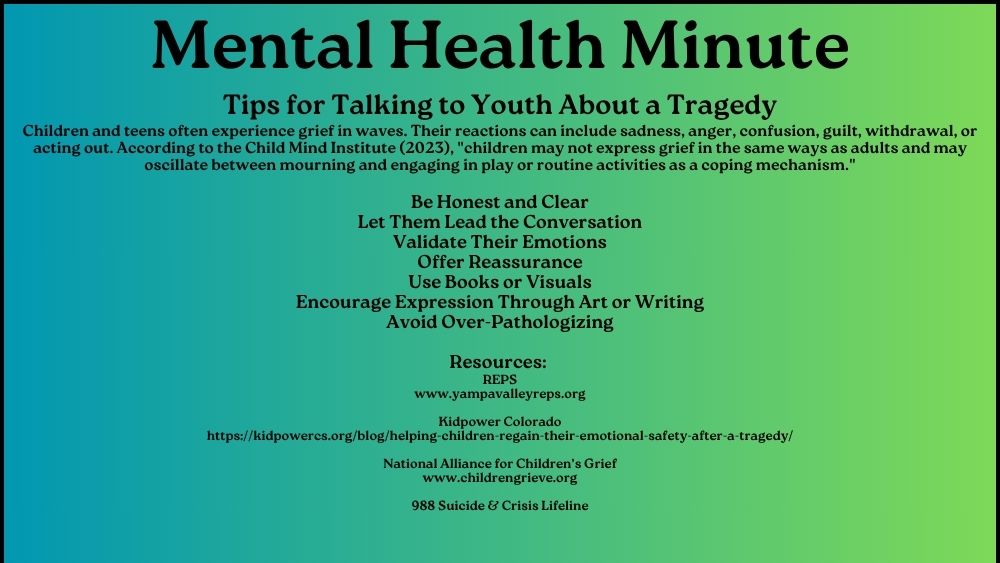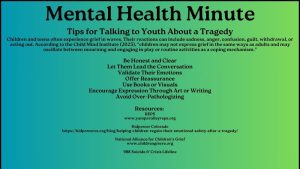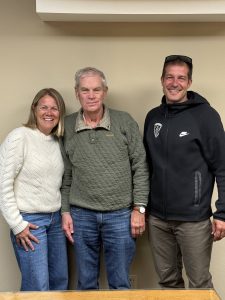Mental Health Minute: Navigating changes in midlife for women
Mental Health Minute

For many women as we head into midlife, changes to our physical and mental health may take us by surprise. Often, those surprises can leave us feeling alone and bewildered.
While we are navigating our careers and/or families, suddenly we encounter symptoms that may feel overwhelming and often do not discriminate as to how healthy we try to lead our lives.
What I want women to understand is that they are not alone, every single woman who is privileged to enter midlife will experience the changes that the menopause journey brings. The degree of symptoms felt will vary, as does the age that you may start to enter this time of life. Simply understanding what is happening, having a support system, and gathering tools to manage this time of life is crucial to our mental well-being.
By the time we hit our mid 40s we can feel as if we finally are starting to figure it all out in our personal and professional lives, and these changes may leave us questioning what we know about managing our own health journey.
Stages of menopause transition:
• Perimenopause is defined as the transitional period leading up to menopause when hormone levels fluctuate and our bodies prepare for the end of menstruation. The most common ages for symptomatic perimenopause are mid 40s to early 50s although there are always those on either ends of that range. This stage is often where we feel the most symptomatic.
• Menopause is technically the day that you have gone 12 months without a menstrual cycle. The most common ages for naturally occurring menopause are late 40s to mid-50s.
• Post-menopause is the rest of your life after your cycle ceases.
• Other factors may confound understanding where you are in these stages such as lifelong irregular cycles, early ovarian failure, and partial hysterectomy.
Some common symptoms experienced as the ovaries stop regularly producing the previous levels of our main sex hormones, progesterone and estrogen, are below. Some symptoms may be mild and some severe, what I want is for women to talk about this and realize that it is a natural part of life. What we need is support, tools, and education so that we do not feel alone in this journey. It is important to state that most women will not experience all or many of these symptoms, but if you are noticing a few, you realize what it is.
It is not in your head.
Common symptoms:
• Fatigue
• Brain fog
• Weight gain
• Irregular cycles
• Disrupted sleep
• Injuries to the tendons and ligaments
• Headaches
• Anxiety
• Hot flashes and night sweats or generally feeling warmer
• Decrease in thirst sensation leading to dehydration
• Joint pain and muscles aches
• Mood swings
• Heart palpitations
• Thinning hair
• Dry skin
• Gastrointestinal disruptions as our gut flora changes with fluctuating hormones
What can we do and where do we start:
• Speak to your OBGYN or knowledgeable MD about symptoms and options. I suggest a symptom and cycle journal either handwritten or on an app.
• Learn about how your individual nutrition needs change in midlife. Undereating can create as many issues as overeating, and maintaining a healthy weight is important.
• Work on sleep hygiene
• Decrease alcohol
• Keep moving. Focus on regular exercise that incorporates strength training and cardiovascular exercise.
• Take time for yourself, walks, baths, reading, meditation, yoga, etc. Stress relief is very important. You have more than likely spent much of your life taking care of others, and this is a time to make sure you are at the forefront.
• Hydrate
• Keep cultivating friendships — we need them now more than ever.
You do not need a 15-step routine, but self-care is critical to help your body and mind thrive in this time of life.
What I want every woman to know is that there can be so much strength, love, compassion, wisdom and joy on the other side.
I have had a private practice in the Yampa Valley for 17 years, worked in clinical nutrition for 16 years, and I teach Human Nutrition at Colorado Mountain College.
For more information regarding how I can help you navigate and coordinate care while flourishing in this time of life please reach out.
Cara A. Marrs, RD, CPT, CLT, is a Functional Registered Dietitian/Nutritionist. Find more about her services at CaraMarrsWellness.com.

Support Local Journalism

Support Local Journalism
Readers around Steamboat and Routt County make the Steamboat Pilot & Today’s work possible. Your financial contribution supports our efforts to deliver quality, locally relevant journalism.
Now more than ever, your support is critical to help us keep our community informed about the evolving coronavirus pandemic and the impact it is having locally. Every contribution, however large or small, will make a difference.
Each donation will be used exclusively for the development and creation of increased news coverage.









